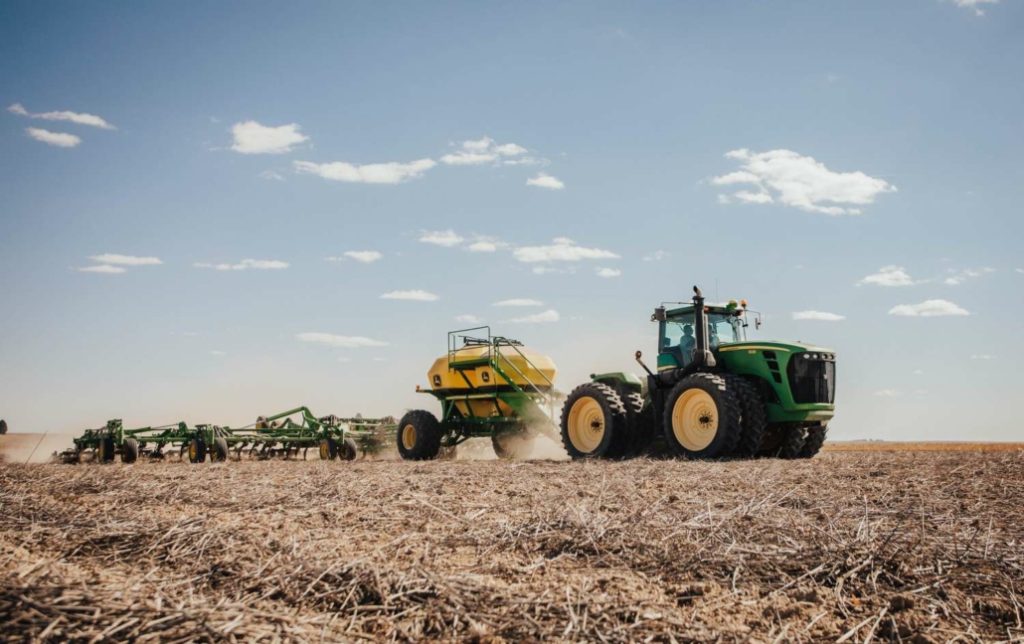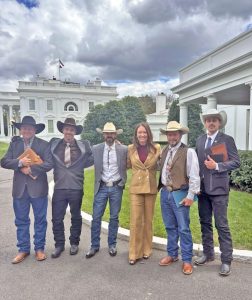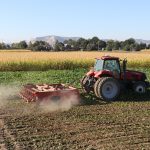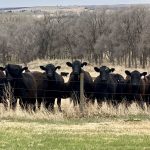Farm programs under permanent law as shutdown begins

As of Oct. 1, because Congress did not pass a new farm bill or extend the 2018 farm bill, Agriculture Department programs that fall under the farm bill are technically operating under the 1938 and 1949 permanent farm laws that have been suspended under more recent farm bills.
There will be no immediate repercussions for farm programs until Jan. 1, however, because the farm bill covers fiscal years and crop years that extend beyond Sept. 30.
According to a Congressional Research Service guide, the first commodity harvested with a 2026 crop year is dairy, which coincides with the calendar year beginning on Jan. 1, 2026. Congress will be under pressure to act on a farm bill or an extension by the end of the calendar year to avoid what’s known as the “dairy cliff.”
Rep. Angie Craig, D-Minn., ranking member on the House Agriculture Committee, said in a statement that it was “the Republican majority’s decision to shut down the federal government.
“Family farmers across the country are already facing increased uncertainty and pressure thanks to the president’s tariffs. Shutting down the government doesn’t improve their situation; it makes it worse. We got here because the Republican Party, which controls the House, Senate and the White House, has been unwilling to work with Democrats to agree on a bipartisan bill that ensures access to health care for millions of rural Americans. We are nearly a year into their majority and all we’ve got to show for it are trade wars, increased cost of living, worsening health care, higher unemployment and more hunger. Republican politicians need to start standing up to this administration’s terrible policies.”
House Agriculture Committee Chairman Glenn “GT” Thompson, R-Pa., said, “By voting to shut down the government, Democrats put critical USDA services in jeopardy. These political games harm rural America through disruptions to farm payments, disaster relief, food assistance and other critical services. Performative photo ops at state fairs and lip service to the producers who feed, fuel and clothe our country won’t hide the truth — Democrats forcing a government shutdown only inflicts more pain on our agricultural economy.”
A sign on the door to Thompson’s personal office said his staff would not be in the office during the shutdown, but Ben Goldey, a spokesman for the House Agriculture Committee Republicans, said the GOP committee staff is working.
“A skeleton crew is working to ensure the congressman’s constitutional responsibilities are being met, and we are hopeful that Senate Democrats will end this mess sooner rather than later,” Renée Gamela, deputy chief of staff in Thompson’s personal office, said in an email to The Hagstrom Report.
Craig (@Angie Craig) posted on X: “My office was open yesterday. It’s open today. And it will be open every day through the Republican shutdown.” She also posted a photo of the notice on her door that her office is open.
Meanwhile, the Agriculture Department has released a guide to its shutdown, but has also posted the following message on its website: “Due to the Radical Left Democrat shutdown, this government website will not be updated during the funding lapse. President Trump has made it clear he wants to keep the government open and support those who feed, fuel and clothe the American people.”
Similar messages have appeared on other executive branch websites, raising questions about the legality of making such partisan statements on a government website.
The National Organic Program, a division of USDA’s Agricultural Marketing Service, said in an announcement Wednesday that whether the National Organic Standards Board’s fall meeting scheduled for Nov. 4-6 in Omaha, Neb., takes place will depend on how long the shutdown lasts.
The message said: “If NOP staff return by opening of business (9 a.m. Eastern) on Oct. 16, 2025, the board meeting will take place in-person in Omaha, Neb. The meeting and the public comment webinars will also be livestreamed. If NOP staff return after opening of business Oct. 16 and before opening of business (9 a.m. Eastern) Oct. 22, 2025, the meeting and public comment webinars will take place virtually. If NOP staff do not return by opening of business (9 a.m. Eastern) Oct. 22, 2025, the NOSB fall meeting and public comment webinars will be canceled.”
The National Milk Producers Federation sent its members a memo on the impact of the shutdown on the dairy industry.
The Senate today voted 55-45 to reject a Republican bill to reopen the government and 53-47 to reject a Democratic counterproposal.
The House is out of session until next week.
While leaders of both parties remain at odds, rank-and-file lawmakers continue talking across party lines about how to resolve the impasse, according to media reports.
In a letter to Sen. Joni Ernst, R-Iowa, a member of the Senate Agriculture Committee, Congressional Budget Office Director Phillip Swagel described the full effects of the shutdown.
George Kelemen, senior vice president for Share Our Strength and its No Kid Hungry campaign, said that if Congress cannot quickly reach a compromise, “the administration should immediately release the necessary contingency funds and provide guidance on spending flexibility to state agencies so families across our country can continue to receive critical nutrition assistance until an agreement is reached.”
Share Our Strength noted that Supplemental Nutrition Assistance Program, the Special Supplemental Nutrition Assistance Program for Women, Infants and Children and other child nutrition programs have operated without interruption during past shutdowns.
Sharon Parrott, president of the Center on Budget and Policy Priorities, a liberal group that often makes statements about the need for nutrition programs, said, today, “I have long opposed shutdowns and debt limit brinkmanship, but the administration’s actions will harm people, the economy, and our democracy for years to come if they are not stopped. … Congress must ensure that any funding deal stops the administration from unilaterally or illegally undoing parts of bipartisan funding laws simply because the president dislikes them, or no agreement reached will be worth the paper it is written on. It is long-settled law that these unilateral funding cuts — known as impoundment — are illegal.”
Mike Lavender, policy director for the National Sustainable Agriculture Coalition, said, “In a challenging moment for farmers and the farm economy, the government shutdown will further destabilize — and in some cases, stop — federal services that offer critical loans, disaster assistance, conservation funding and more. The shutdown also threatens food safety, leaving states on the hook to fund food safety inspections once their cooperative agreements expire. With nearly half of all U.S. Department of Agriculture staff furloughed, farmers can expect limited services and delayed payments. These disruptions will worsen with time and be exacerbated if the administration implements a ‘reduction-in-force’ plan to fire more USDA employees. NSAC encourages Congress and the president to set aside finger pointing and work toward an agreement that brings stability to farmers and the communities they call home.”






